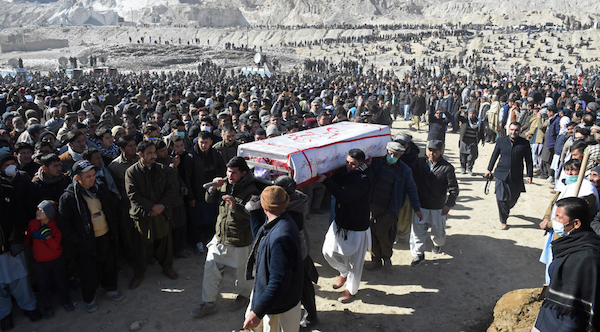
Mourners from the Shia Hazara community carry the coffin of one of the miners during a funeral procession at a graveyard in Quetta on January 9, 2021. (Photo by AFP)
Pakistani mourners have eventually buried the bodies of Hazara Muslims, who were brutally killed at the hands of Daesh terrorists in the country’s Balochistan province.
Tens of thousands of people gathered to bury the bodies of 11 Hazara miners in a cemetery of the city of Quetta on Saturday.
Authorities deployed security forces to the area where more than 4000 people gathered for the funeral ceremony.
Protesters staged a sit-in after the Takfiri terrorists kidnapped and killed the miners last Sunday near a remote coal mine in the southwestern mountainous Mach area.
Though Muslims are obliged to bury dead bodies as quickly as possible, Pakistanis kept refusing to bury the Hazara victims, demanding that Prime Minister Imran Khan visit the grieving community in Quetta.
Islamabad finally reached an agreement with the protesters late Friday to arrest the attackers, pay compensation to the families of the victims and improve security for the Hazara.
The provincial government will form a joint investigation team to recommend action against those found guilty of negligence leading to the incident, according to the agreement.
Khan described the sit-in protest as blackmail, sparking protests across the country, including in the capital on Friday.
No premier of any country should be blackmailed like this, Khan said in televised remarks.
In the wake of mass protests, his office said on Saturday that Khan had flown to Quetta and was expected to arrive shortly.
He visited Quetta after the burial and met people close to the protest site. The prime minister said that the attack on the miners was meant to stoke sectarian conflict in the country.
He had already sent a group of his ministers and top officials to negotiate with the Hazara community for the burial.
The Hazara community, who make up most of the Shia population in Quetta, frequently come under attack by terrorists active in Pakistan’s restive and mineral-rich Balochistan province.
In 2013, three separate bombings killed more than 200 people in different Hazara neighborhoods.
Quetta, the largest city of Balochistan, has seen several bombings and shooting attacks over the past years.
The latest agreement also called for setting up a high-level commission headed by Balochistan’s home minister to investigate attacks against the Hazara community in the past 22 years.
LINK: https://www.ansarpress.com/english/21895
TAGS:






























 online news tv
online news tv




